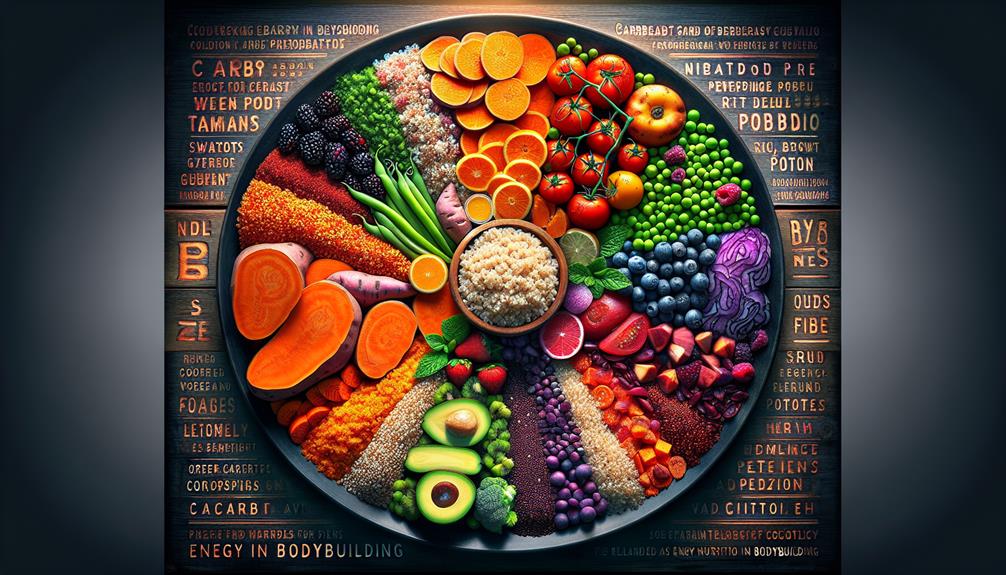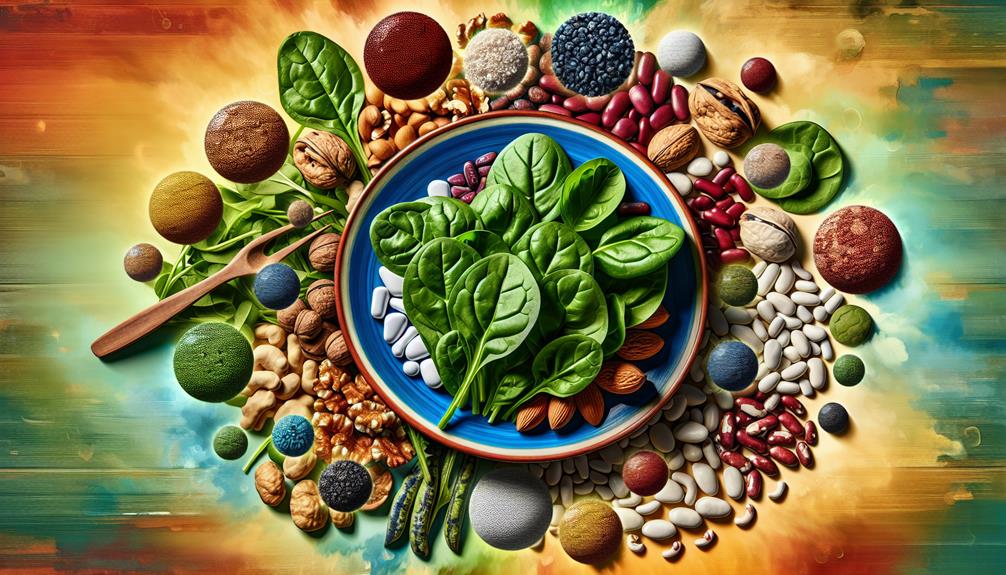Balancing macronutrients (carbs, protein, fats) is key for muscle growth and repair. Proper timing and meal prep are crucial strategies. Protein supports muscle building, carbs provide workout energy, and fats help hormone balance. Micronutrients like vitamins and minerals aid overall health and muscle function. Antioxidants combat oxidative stress and aid recovery. Hydration with electrolytes (sodium, potassium, magnesium) is vital for muscle function. Develop a personalized hydration plan based on weight and activity level. Consistent water intake is important, and urine color reflects hydration status. Optimizing these balances can enhance bodybuilding results.
Key Takeaways
- Prioritize protein intake for muscle repair and growth.
- Balance carbohydrates for energy during workouts.
- Include healthy fats for hormone support.
- Ensure micronutrient intake for overall health.
- Maintain hydration and electrolyte balance for optimal performance.
Importance of Macronutrients
When building muscle and optimizing performance, understanding the importance of macronutrients is crucial for achieving your fitness goals. Macronutrients, namely carbohydrates, proteins, and fats, play a fundamental role in providing the energy and building blocks necessary for muscle growth and recovery.
To maximize the benefits of macronutrients, nutrient timing and meal prepping are essential strategies to consider.
Nutrient timing involves consuming specific macronutrients at strategic times to support exercise performance, muscle protein synthesis, and recovery. Pre-workout meals rich in carbohydrates can provide the energy needed for intense training sessions, while post-workout meals high in protein aid in muscle repair and growth. Planning and preparing meals in advance through meal prepping can help ensure that you meet your macronutrient goals consistently.
Moreover, maintaining a caloric surplus, coupled with tracking macros, is crucial for muscle building. Consuming more calories than your body expends provides the energy needed for muscle growth, while tracking macros ensures that you meet your specific macronutrient targets to support performance and recovery.
Protein: The Building Block
Understanding the role of protein as the primary building block for muscle growth is foundational in optimizing bodybuilding nutrition. Proteins are essential for muscle repair and growth due to their rich amino acid content, which serves as the building blocks for muscle protein synthesis. Amino acids, the components of protein, play a crucial role in repairing muscle tissues that undergo stress during workouts and initiating the growth process necessary for muscle hypertrophy.
In bodybuilding, consuming an adequate amount of high-quality protein is vital to support muscle recovery and promote muscle growth. Proteins contain essential amino acids that the body can't produce on its own, making dietary intake crucial for maintaining muscle health. Incorporating protein-rich sources such as lean meats, poultry, fish, eggs, dairy products, legumes, and plant-based protein supplements can help bodybuilders meet their protein requirements and support optimal muscle repair and growth.
Carbohydrates for Energy

Carbohydrates play a crucial role in providing the necessary energy for bodybuilders to fuel their workouts and support optimal performance during training sessions. Carb loading, a strategy where individuals increase their carbohydrate intake in the days leading up to an event or intense workout, can help maximize muscle glycogen stores, enhancing endurance and performance.
Pre-workout snacks rich in carbohydrates, such as a banana with almond butter or whole grain toast with honey, can provide a quick source of energy to kickstart your training session.
It is essential to choose complex carbohydrates like whole grains, fruits, and vegetables over simple sugars to sustain energy levels and maintain stable blood sugar levels during workouts. These carbohydrates are digested more slowly, providing a steady release of energy over time. Timing your carbohydrate intake around your workouts can further optimize performance. Consuming a balanced meal containing carbohydrates, protein, and fats about 2-3 hours before exercising can help fuel your body adequately for training.
Healthy Fats for Hormone Balance
Healthy fats are essential for maintaining hormone balance in the body, supporting various physiological functions critical for optimal performance and muscle growth. When it comes to hormone regulation and lipid sources, here are four key points to consider:
- Omega-3 Fatty Acids: Found in fatty fish like salmon and mackerel, as well as chia seeds and walnuts, omega-3s play a crucial role in reducing inflammation and supporting overall hormone function.
- Monounsaturated Fats: Sources such as avocados, olive oil, and nuts provide the body with healthy fats that help in the production of hormones like testosterone, essential for muscle growth and repair.
- Saturated Fats: While often demonized, sources like coconut oil and grass-fed butter are important for hormone synthesis, especially in the production of steroid hormones.
- Polyunsaturated Fats: Including both omega-3s and omega-6s from sources like flaxseeds and sunflower seeds helps maintain a healthy balance of fatty acids, supporting hormone production and overall health.
Ensuring a well-rounded intake of these healthy fats is crucial for sustaining optimal hormone levels and supporting your bodybuilding goals.
Micronutrients for Vitality

To optimize bodybuilding performance and muscle growth, attention to micronutrients for vitality is key in maintaining overall health and supporting physiological functions. Micronutrients are essential vitamins and minerals that play crucial roles in various bodily processes, including antioxidant power and energy metabolism. Antioxidants such as vitamins C and E, and minerals like selenium and zinc, help combat oxidative stress caused by intense workouts, aiding in muscle recovery and reducing inflammation.
Moreover, micronutrients are vital for energy metabolism, as they act as cofactors in enzymatic reactions that convert food into energy for muscle contractions and overall performance. Minerals like iron, magnesium, and potassium are particularly important for maintaining optimal energy levels during training sessions and promoting muscle function.
Ensuring an adequate intake of micronutrients through a balanced diet or supplementation can enhance vitality, support immune function, and optimize body composition for bodybuilders aiming to achieve peak performance and muscle growth. By prioritizing micronutrient intake, individuals can promote overall well-being and maximize their bodybuilding potential.
Vitamins for Recovery and Immunity
In enhancing recovery and bolstering immunity for optimal bodybuilding performance, a strategic focus on essential vitamins is paramount. When it comes to vitamins for recovery and immunity, here are four key elements to consider:
- Vitamin C: Known for its immune-boosting properties, vitamin C plays a crucial role in reducing oxidative stress and inflammation post-workout, aiding in overall recovery.
- Vitamin D: Essential for muscle function and repair, adequate levels of vitamin D have been linked to improved recovery times and enhanced immune support.
- Vitamin E: Acting as a powerful antioxidant, vitamin E helps protect cells from damage, supporting the body's recovery process and strengthening the immune system.
- Vitamin B6: This vitamin is involved in over 100 enzymatic reactions in the body, including those related to protein metabolism and immune function, making it a vital component for recovery essentials and immune support in bodybuilding.
Minerals: The Forgotten Heroes

Minerals, often overlooked yet essential for optimal body function and performance, play a crucial role in bodybuilding nutrition. These micronutrients are vital for various physiological processes, including muscle contractions, energy production, and maintaining electrolyte balance.
Two key minerals for bodybuilders are calcium and magnesium. Calcium is essential for muscle function, nerve transmission, and most importantly, bone health. Adequate calcium intake, along with vitamin D, is crucial for mineral absorption and overall skeletal strength. Magnesium, on the other hand, plays a role in over 300 enzymatic reactions in the body, including protein synthesis and muscle function.
When it comes to mineral absorption, it's important to note that certain factors can hinder or enhance absorption. For instance, phytates in whole grains and legumes can inhibit mineral absorption, while vitamin C can enhance it. To support bone health and overall performance, ensuring adequate intake of minerals through a balanced diet and possibly supplementation is essential for bodybuilders.
Hydration: The Unsung Hero
Moving from discussing minerals, it becomes evident that hydration stands out as a fundamental yet often underestimated factor in bodybuilding nutrition. Proper hydration is crucial for optimal performance and recovery. Here are four key points to consider when it comes to hydration in bodybuilding:
- Electrolyte Balance: Maintaining electrolyte balance is essential for muscle function and overall hydration levels. Electrolytes like sodium, potassium, and magnesium play a vital role in muscle contractions and nerve impulses.
- Hydration Strategies: Develop a personalized hydration plan based on your body weight, activity level, and sweat rate. Aim to drink water consistently throughout the day and consider factors like temperature and workout intensity that may increase your fluid needs.
- Timing Matters: Hydrate before, during, and after your workouts to support performance and recovery. Dehydration can impair strength and endurance, so staying hydrated is key to maximizing your training sessions.
- Monitor Urine Color: A simple way to gauge hydration status is by checking the color of your urine. Aim for a pale yellow color, indicating adequate hydration levels. Darker urine may signal dehydration and the need to drink more fluids.
Frequently Asked Questions
Can Bodybuilders Still Build Muscle Without Counting Macros and Tracking Their Intake?
Yes, we can build muscle without tracking macros. By focusing on consistent training, adequate protein intake, and overall caloric balance, progress can be made. Tracking progress through strength gains and visual changes can also ensure success.
How Do Different Cooking Methods Affect the Nutrient Content of Foods for Bodybuilders?
When considering nutrient retention and absorption in food preparation, different cooking methods play a crucial role. Techniques like steaming and grilling are known to better preserve nutrients compared to frying or boiling, enhancing overall nutrient intake.
Are There Any Specific Micronutrients That Bodybuilders Should Focus on for Optimal Performance?
We focus on micronutrient importance for optimal performance. Bodybuilders benefit from adequate intake of key nutrients like iron, calcium, and zinc. These micronutrients aid muscle function and recovery, supporting our fitness goals.
How Does Timing of Nutrient Intake Throughout the Day Impact Muscle Growth and Recovery?
Timing of nutrient intake plays a crucial role in muscle growth and recovery. Strategic distribution of nutrients throughout the day optimizes performance and supports the body's ability to repair and build muscle, enhancing overall results.
Is It Necessary for Bodybuilders to Take Supplements in Addition to a Balanced Diet to Meet Their Nutritional Needs?
Yes, supplements can be beneficial for bodybuilders to ensure they meet their nutritional needs alongside a balanced diet. Achieving optimal nutritional balance is crucial for muscle growth and recovery, and supplements can help fill any gaps.
Conclusion
In conclusion, ensuring a balance of macronutrients and micronutrients in your bodybuilding nutrition plan is essential for optimal performance and results.
Just like how a well-oiled machine operates smoothly, your body functions best when fueled with the right nutrients.
Remember, your body is a temple, treat it with the respect it deserves.
So, go ahead and feed your muscles with the right nutrients, and watch them grow like never before.













